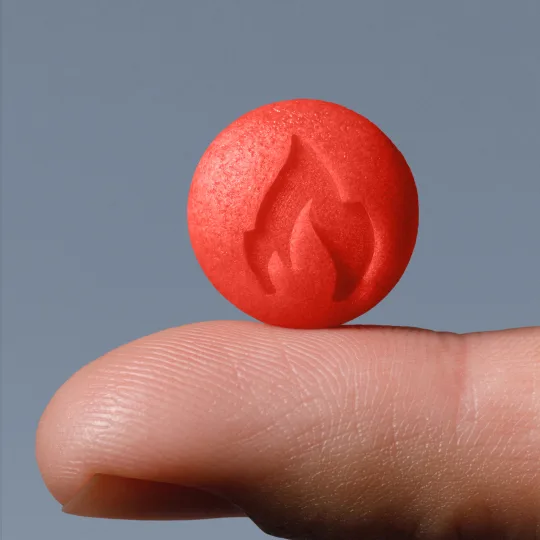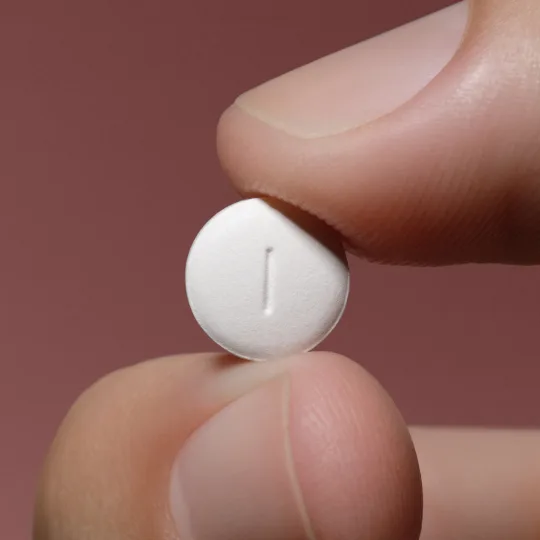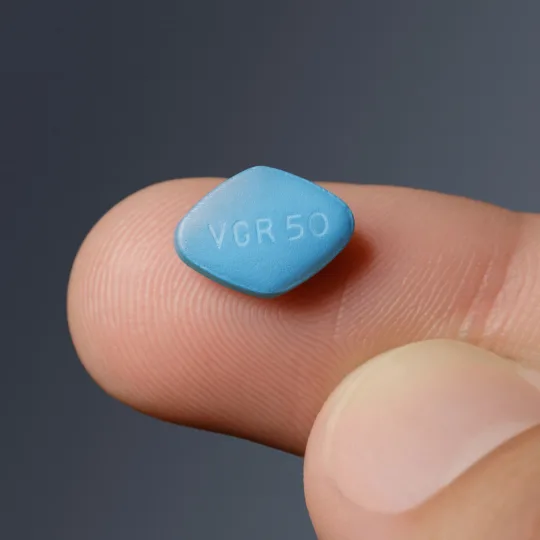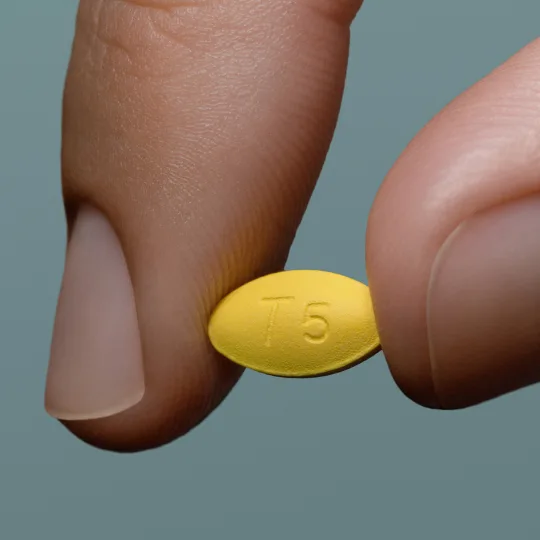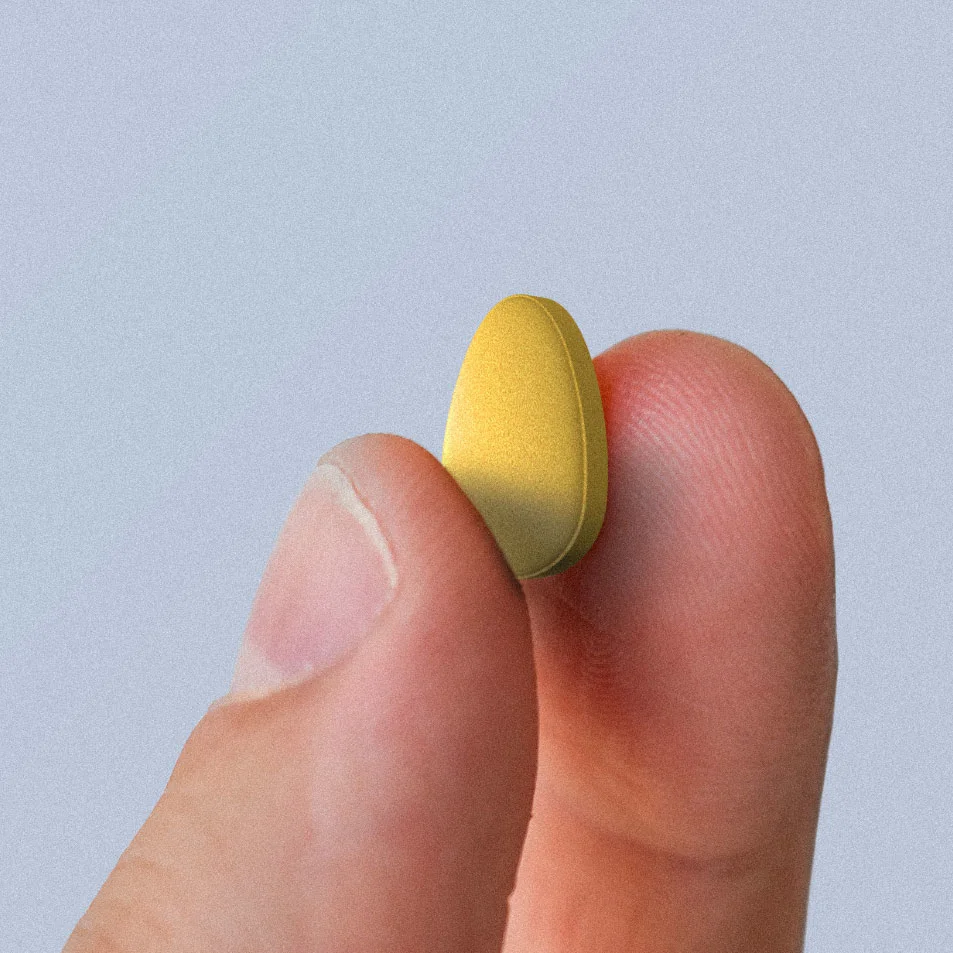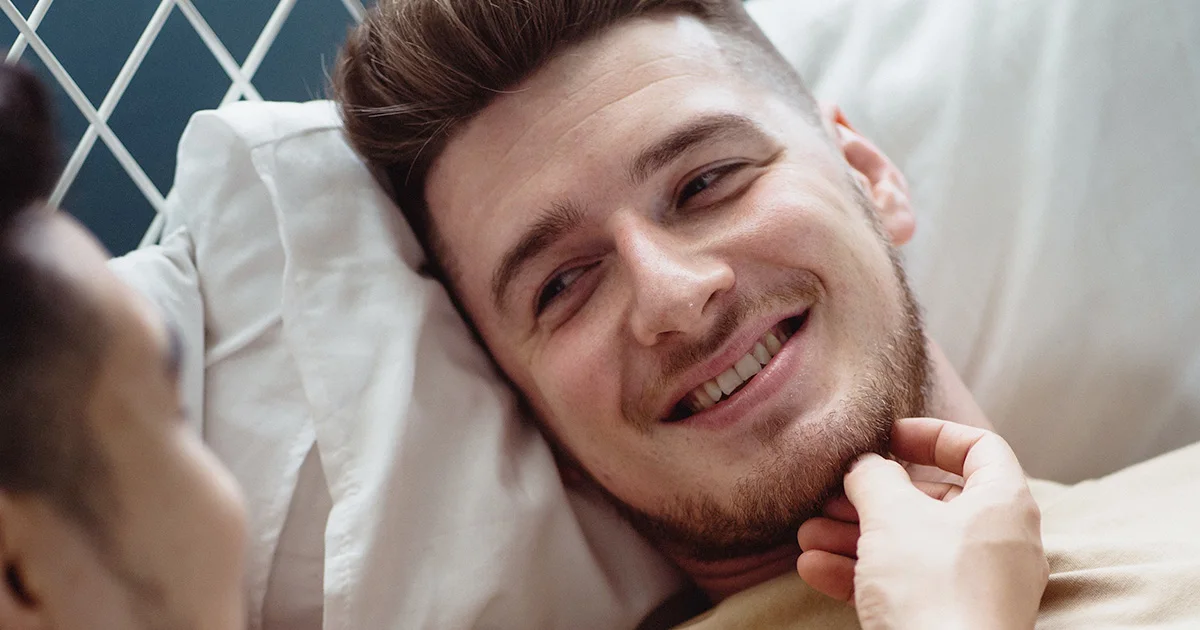Key takeaways
Since erectile dysfunction (ED) can have many different causes, there isn’t really one simple trick to cure or manage it.
Potential causes can include physical and mental health conditions, lifestyle factors, and some medications.
However, there are plenty of accessible options to treat ED, including lifestyle changes (e.g. exercising regularly, eating a healthy diet) and prescription medications (e.g. Viagra, Cialis).
Here's what we'll cover
Here's what we'll cover
Key takeaways
Since erectile dysfunction (ED) can have many different causes, there isn’t really one simple trick to cure or manage it.
Potential causes can include physical and mental health conditions, lifestyle factors, and some medications.
However, there are plenty of accessible options to treat ED, including lifestyle changes (e.g. exercising regularly, eating a healthy diet) and prescription medications (e.g. Viagra, Cialis).
If you experience erectile dysfunction (ED), you’re not alone. In fact, ED affects 30–50 million people in the United States. Erectile dysfunction is a common experience, so you may be wondering, is there a simple trick to cure ED? Unfortunately, there isn't. While gas station pills and supplements claim to enhance your sexual prowess, and lifestyle changes to improve cardiovascular health can enhance sexual function, there’s no substitute for safe, effective, evidence-based ED treatment.
That brings us to the good news. For most people, ED is treatable. Continue reading to learn about what causes ED, lifestyle changes to improve your sexual function, and ED medication.
Have better sex with Ro
What is erectile dysfunction?
Erectile dysfunction (ED) is defined as having difficulty getting or maintaining erections that are long-lasting and strong enough for satisfying sex. ED is characterized by an ongoing problem. Sometimes, you’re just not in the mood, or you lose an erection at an inopportune time—neither of these are considered ED.
Erections are a complicated process, and it takes a lot to make them happen. Following arousal, your hormones, nerves, blood vessels, and brain work together to increase blood flow to your penis and decrease blood flow out of it, resulting in an erection. When something interferes with a part of this process, ED may develop.
ED is defined as a sexual health issue, but the impact of ED can extend beyond your sex life. ED is linked to low self-esteem, can affect your relationship with sexual partner(s), lead to shame, anxiety, and depression, and even affect your productivity at work. If this list isn’t enough to motivate you to make an appointment with your healthcare provider, ED can also be a sign of a potentially serious underlying health condition (more on that below).
Causes of erectile dysfunction
There are many potential causes of ED, from an underlying health condition to your mental health or lifestyle.
Physical causes of ED
Several health conditions have been linked to ED. People with obesity are 50% more likely to have ED. Undiagnosed diabetes is up to three times more likely in people with ED — and the longer you have diabetes, the higher your risk of ED.
Heart health is also linked to sexual health. Roughly half of people with proven coronary artery disease also have ED. Because issues with blood vessels can result in ED, having ED may mean you’re at higher risk of cardiovascular disease, including stroke or heart attack. People with ED should also check their blood pressure to make sure that isn’t an issue.
Additional conditions associated with ED include:
Multiple sclerosis
Thyroid disorders
Traumatic injury or fractures of the pelvis
Hyperlipidemia (high cholesterol)
Sleep apnea
Chronic obstructive pulmonary disease (COPD)
The risk of erectile dysfunction increases with age–ED affects up to 50% of biological men in their 50s. By the time they enter their 60s, the percentage increases to 74%. That said, ED can affect people of any age. In fact, one study showed that one in four men seeking treatment for ED are under the age of 40.
Lifestyle causes of ED
Your lifestyle can contribute to and exacerbate ED. Smoking, obesity, drinking alcohol, and recreational drug use can all significantly increase your risk of ED. A sedentary lifestyle with little physical activity is associated with ED, as is following an unhealthy diet. Both of these factors can contribute to obesity.
Poor sleep can also increase your risk of ED, especially if you have a diagnosed sleep condition like insomnia or obstructive sleep apnea (OSA). ED is highly prevalent among people with OSA, and research estimates that up to 80% of cases remain undiagnosed.
Psychological causes of ED
Mental health can be as much of a contributing factor to ED as physical illness and lifestyle. Sexual performance anxiety and relationship issues can also contribute to ED, as can depression, anxiety, and stress. Those with depression may be 40% more likely to have ED. Conversely, people with ED are three times more likely to have depression. In some people, there may be a cycle that can be difficult to break free from.
As many as 37% of people with ED may have an anxiety disorder. Anxiety disorders include generalized anxiety disorder, post-traumatic stress disorder (PTSD), obsessive-compulsive disorder, social anxiety disorder, and panic disorder. Erectile dysfunction can also be a side effect of many medications people take to manage anxiety and depression, like antidepressants.
Medication that can cause ED
A lot of commonly used medications, like those used to treat high blood pressure or depression, can contribute to ED. Some of these medications include:
Antidepressants , especially selective serotonin reuptake inhibitors (SSRIs)
Antihypertensives, especially beta-blockers
Antipsychotics
Opioids
Hormonal medications
Anticonvulsants
Talk to your healthcare provider if you’re concerned your medication is interfering with your erections. Do not change your dosage or stop taking your medicines without talking to your healthcare provider. They may change your dosage or switch you to a different medication that is less likely to cause ED.
Is there a simple trick to cure ED?
Like the Fountain of Youth, the quick-fix, simple trick to cure ED eludes us. And with such an extensive list of potential causes, it’s no wonder there’s no one-size-fits-all solution. Many causes of ED are complex and, therefore, may require prescription treatment. Fortunately, there are several proven treatment options for ED.
5 natural ways to treat erectile dysfunction
Depending on your diagnosis, your healthcare provider may recommend some simple lifestyle changes to decrease your ED, on their own or in conjunction with drugs like Viagra (sildenafil) or Cialis (tadalafil). The following steps may improve not only your erections but your overall quality of life and health as well.
1. Eat a healthy diet
Eating better can relieve ED. If you are overweight or obese, following a healthy diet (and limiting your calories) can help you lose weight, which in itself is linked to improved sex life. The following foods may help support your heart health and sexual function:
Foods high in lycopene: tomatoes, watermelon, grapes, peaches, and cranberries
Foods high in folic acid: leafy greens, eggs, beans, grains, nuts, and poultry
Foods high in capsaicin: Cayenne, jalapenos, and other spicy peppers
Omega-3 fatty acids: seafood, and in particular, oysters
Caffeine (in moderate amounts, as high amounts can be dangerous)
Dark chocolate
In a study of men with obesity or overweight, weight loss of 5%–10% of their body weight improved erectile function. Just as certain foods may improve your sexual function, certain foods may hinder it. Avoid fried foods and foods with lots of added sugar, as they can impact your cardiovascular health and, in turn, have a negative impact on erections.
2. Exercise often
Regular exercise is associated with a lower risk of ED. Exercise improves overall health, including penile health and testosterone levels. It can also improve erections by boosting nitric oxide production, the helpful molecule that relaxes the muscles in your penis, enabling blood flow during an erection. While both aerobic exercise and strength training can help with ED, aerobic exercise of moderate-to-vigorous intensity, like running or cycling, has proven to be the most effective.
How much exercise should you aim for? Some experts recommend 40 minutes of intense aerobic exercise four times per week, though you should talk to a healthcare provider before making any drastic changes to your routine. Studies show that within six months, exercising this amount decreased erection issues in people who had ED due to a sedentary lifestyle or a health condition like obesity, hypertension, metabolic syndrome, or heart disease.
3. Manage your stress
Stress can impact multiple aspects of your life, including your sex life. ED itself can lead to chronic stress, which can, in turn, worsen the symptoms of ED. One study from 2014 found that, when combined with tadalafil (an oral ED medication and the active ingredient in Cialis), stress management programs can help relieve both stress and ED.
If poor mental health contributes to your ED, take heart in knowing that therapy and counseling can help alleviate the symptoms of the condition. Consider exploring these stress management techniques:
Deep breathing exercises
Progressive muscle relaxation
Mindfulness meditation
Guided imagery or visualization
Exercise (yes, it helps with stress, too)
Cognitive behavioral therapy (CBT)
4. Get enough sleep
Our society often overvalues work and productivity, but good sleep (and enough of it) is essential for your health. In fact, some researchers consider sleep the “third pillar of health,” along with diet and exercise. Poor sleep is linked to ED as well as other health issues.
Improve your shut-eye by improving your sleep hygiene—something that can be done with the following techniques:
Get 7–8 hours of sleep each night
Avoid daytime naps
Limit caffeine in the afternoon and evening
Get some sunlight during the day
Put away electronics before bed
5. Avoid excessive drinking and smoking
Excessive alcohol use and smoking are both associated with an increased risk of ED. Alcohol can have negative short-term and long-term effects on erectile function. Smoking exposure is harmful whether you smoke yourself or are exposed to secondhand smoke.
Quitting smoking can improve your cardiovascular health and erections. Within one year, men who quit smoking reported significant improvements in their erections, with even better results at a later follow-up.
Additional effective treatments for erectile dysfunction
If you’ve experienced the following, it may be time to consult a healthcare provider, be it in-person (think: your GP) or online (such as through Ro):
You’ve had difficulty getting or maintaining a strong enough erection for satisfying sex.
You’ve noticed your symptoms are getting worse.
Your erection difficulties are affecting your overall quality of life.
During your appointment, your healthcare provider will likely ask questions about your erections and your sex life. They may perform a physical exam, order a blood test, or suggest a referral to a specialist or a mental health provider. Some of the erectile treatment options they may recommend include prescription medications, penile devices, or implants.
Prescription medications
Prescription medications are considered some of the most effective options for ED—so much so, in fact, that they’re often used as a first-line treatment for the condition. Many ED medications belong to a class of drugs called phosphodiesterase-type 5-(PDE5) inhibitors. Simply put, they work in part by increasing blood flow to the penis, resulting in stronger, longer-lasting erections. However, ED medications aren’t magic pills–for them to work, you first have to be sexually aroused.
Some ED medication options your provider may suggest include:
Viagra (sildenafil). You may have heard of “the little blue pill,” aka Viagra. It’s the branded version of the drug sildenafil. People typically take this drug at least 60 minutes before sex on an empty or close-to-empty stomach. The effects can usually be seen 30–120 minutes after you take it, though it stays in your system for 4–5 hours.
Cialis (tadalafil). Cialis and its generic, tadalafil, can be taken daily or as needed. The drug typically starts working within 30–60 minutes, and its effects can last up to 36 hours. When taken daily at a lower dose, it allows for more spontaneous sexual activity rather than timing sex around a dose.
Vardenafil. Previously available as brand-name Levitra, vardenafil is only available as a generic today. Still, the basic stats remain the same: The medication can begin to take effect in as little as 10 minutes, though the common recommendation is to take it about 60 minutes before sex. Vardenafil stays in your system for 5–7 hours.
Ro Sparks. This 2-in-1 treatment contains the same active ingredients as Viagra and Cialis—sildenafil and tadalafil—in a sublingual (i.e. under-the-tongue) form. This means it dissolves under your tongue for fast-acting effects. Ro Sparks gets you hard in 15 minutes on average and keeps you ready for up to 36 hours (thanks to the tadalafil).
Ro’s Daily Rise Gummies. These fruit-flavored gummies are formulated with tadalafil (the active ingredient in Cialis) and designed to be taken once daily. Since the medication stays active in your body for over 24 hours and you’re taking one gummy per day, you should always be ready for sex—no need to schedule your sexual activities around taking medication.
Devices or implants
Another common ED treatment is a penis pump, also known as a vacuum erection device. This gadget, if you will, consists of a plastic chamber that you put your penis into and a pump that’s powered by battery or by hand. The suction from the pump increases blood flow to the penis, which causes an erection.
Penile injections, also known as intracavernosal pharmacologic therapy, can also be a very effective treatment for men who do not respond to standard PDE5 inhibitor medications. It involves injection of a medication that acts on the blood vessels of the penis to enhance blood flow, resulting in an erection within 10-15 minutes of self-injection into the penis.
If prescription medications and a penis pump are unsuccessful in treating ED, another option to explore with your healthcare provider is a penile implant: an inflatable or rigid device implanted under the skin of the penis to achieve erection. While penis implants are generally not a first-line treatment for ED, they can be an option for persistent ED that doesn’t respond to other methods.
Short of penile implants, newer experimental treatments include shockwave therapy to the penis and platelet-rich plasma (PRP) injections. Shockwave therapy appears to enhance blood flow and erections for men who have abnormalities in blood flow to the penis that cause ED.
Can you prevent erectile dysfunction?
The above tips for naturally treating ED are also ways to prevent it. For example, regular exercise is associated with a lower risk of ED and has also been shown to prevent it. A lack of physical activity is one of the most reversible risk factors for ED and one that is totally in your control (unless you have a medical condition that limits your ability to exercise).
Likewise, research suggests that following a plant-based diet, similar to the Mediterranean diet, can help men maintain healthy erectile function and lower the risk of ED well into their 60s.
While ED is more common with age, it is not inevitable. Implementing healthy lifestyle changes, such as exercise, good sleep, and a healthy diet (such as one that focuses on your heart), can help improve your erections now and in the future. So start making these changes today, and schedule an appointment with your health provider to cover your bases. You deserve to feel great about your sex life.
Bottom line
Erectile dysfunction is a common condition with a wide range of possible causes—and seemingly just as many treatment options. While the idea of one simple trick to cure ED might sound appealing, the reality is that effective treatment often depends on identifying the underlying cause. The good news? There are plenty of accessible, proven options that can help.
ED can be caused by physical and mental conditions as well as certain lifestyle habits. Because there are a wide range of reasons for ED, the list of what could be behind the condition can be long, including physical health conditions (e.g. obesity, sleep apnea), mental health conditions (e.g. anxiety, depression), and lifestyle factors (e.g. drug or alcohol consumption).
Just as long as the list of potential causes of ED is the list of potential treatments. Natural options can include eating a healthy, balanced diet, exercising often, managing stress, and getting enough sleep nightly.
Prescription medications, such as Viagra and Cialis, are often used as first-line treatment for ED. While they have been shown to be particularly effective, other more “medical” treatment options can include devices such as penis pumps.
While none of the methodologies can be considered the one simple trick to cure ED that everyone should know, the right approach can make a significant difference, especially when it’s tailored to each person's individual needs and health profile. The key to finding an ED treatment that’s a fit for you is working closely with a healthcare provider who can help identify the underlying cause and recommend the most effective options based on your health history and status.
Frequently asked questions (FAQs)
What is the fastest way to get rid of erectile dysfunction?
The fastest way to get rid of erectile dysfunction—at least temporarily—is often with an oral Rx medication, such as Viagra (sildenafil), Cialis (tadalafil), or vardenafil. These drugs can start working within 30–60 minutes (sometimes as fast as 15–30 minutes for sildenafil or 10 minutes for vardenafil) and are effective for many individuals, especially when ED is caused by physical factors like reduced blood flow.
How can I cure ED on my own?
There’s no reason to feel embarrassed about seeking medical care for ED and, frankly, your best bet for safely treating your condition is by consulting a healthcare provider. That said, if you’d rather try to address your symptoms solo, you can do this by making certain lifestyle modifications. These include eating a healthy diet, exercising regularly, and taking care of your mental health.
DISCLAIMER
If you have any medical questions or concerns, please talk to your healthcare provider. The articles on Health Guide are underpinned by peer-reviewed research and information drawn from medical societies and governmental agencies. However, they are not a substitute for professional medical advice, diagnosis, or treatment.
Viagra Important Safety Information: Read more about serious warnings and safety info.
Cialis Important Safety Information: Read more about serious warnings and safety info.
Cho, J. W. & Duffy, J. F. (2019). Sleep, Sleep Disorders, and Sexual Dysfunction. The World Journal of Men's Health, 37(3), 261–275. doi: 10.5534/wjmh.180045. Retrieved from https://www.ncbi.nlm.nih.gov/pmc/articles/PMC6704301/
Duca, Y., Calogero, A. E., Cannarella, R., et al. (2019). Erectile dysfunction, physical activity and physical exercise: Recommendations for clinical practice. Andrologia, 51(5), e13264. doi: 10.1111/and.13264. Retrieved from https://pubmed.ncbi.nlm.nih.gov/30873650/
Elterman, D. S., Bhattacharyya, S. K., Mafilios, M., et al. (2021). The Quality of Life and Economic Burden of Erectile Dysfunction. Research and Reports in Urology, 13, 79–86. doi: 10.2147/RRU.S283097. Retrieved from https://www.ncbi.nlm.nih.gov/pmc/articles/PMC7901407/
Gao, X., Chen, H., Schwarzschild, M. A., et al. (2007). Erectile function and risk of Parkinson's disease. American Journal of Epidemiology, 166(12), 1446–1450. doi: 10.1093/aje/kwm246. Retrieved from https://pmc.ncbi.nlm.nih.gov/articles/PMC2385785/
Gerbild, H., Larsen, C. M., Graugaard, C., et al. (2018). Physical Activity to Improve Erectile Function: A Systematic Review of Intervention Studies. Sexual Medicine, 6(2), 75–89. doi: 10.1016/j.esxm.2018.02.001. Retrieved from https://www.ncbi.nlm.nih.gov/pmc/articles/PMC5960035/
Kalaitzidou, I., Venetikou, M. S., Konstadinidis, K., et al. (2014). Stress management and erectile dysfunction: a pilot comparative study. Andrologia, 46(6), 698–702. doi: 10.1111/and.12129. Retrieved from https://pubmed.ncbi.nlm.nih.gov/23822751/
Kohn, T. P., Kohn, J. R., Haney, N. M., et al. (2020). The effect of sleep on men's health. Translational Andrology and Urology, 9(Suppl 2), S178–S185. doi: 10.21037/tau.2019.11.07. Retrieved from https://www.ncbi.nlm.nih.gov/pmc/articles/PMC7108988/
Krzastek, S. C., Bopp, J., Smith, R. P., et al. (2019). Recent advances in the understanding and management of erectile dysfunction. F1000Research, 8, F1000 Faculty Rev-102. doi: 10.12688/f1000research.16576.1. Retrieved from https://www.ncbi.nlm.nih.gov/pmc/articles/PMC6348436/
Maiorino, M. I., Bellastella, G., & Esposito, K. (2015). Lifestyle modifications and erectile dysfunction: what can be expected?. Asian Journal of Andrology, 17(1), 5–10. doi: 10.4103/1008-682X.137687. Retrieved from https://www.ncbi.nlm.nih.gov/pmc/articles/PMC4291878/
Martin, S. A., Atlantis, E., Lange, K., et al. (2014). Predictors of sexual dysfunction incidence and remission in men. The Journal of Sexual Medicine, 11(5), 1136–1147. doi: 10.1111/jsm.12483. Retrieved from https://pubmed.ncbi.nlm.nih.gov/24548342/
Rew, K. T. & Heidelbaugh, J. J. (2016). Erectile Dysfunction. American Family Physician, 94(10), 820–827. Retrieved from https://www.aafp.org/pubs/afp/issues/2016/1115/p820.html
Sooriyamoorthy, T. & Leslie, S. W. (2023). Erectile Dysfunction. StatPearls. Retrieved Sep. 25, 2023 from https://www.ncbi.nlm.nih.gov/books/NBK562253/
Velurajah, R., Brunckhorst, O., Waqar, M., et al. (2022). Erectile dysfunction in patients with anxiety disorders: a systematic review. International Journal of Impotence Research, 34(2), 177–186. doi: 10.1038/s41443-020-00405-4. Retrieved from https://www.ncbi.nlm.nih.gov/pmc/articles/PMC8964411/
Yafi, F. A., Jenkins, L., Albersen, M., et al. (2016). Erectile dysfunction. Nature reviews. Disease Primers, 2, 16003. doi: 10.1038/nrdp.2016.3. Retrieved from https://www.ncbi.nlm.nih.gov/pmc/articles/PMC5027992/
Yang, H., Breyer, B. N., Rimm, E. B., et al. (2022). Plant-based diet index and erectile dysfunction in the Health Professionals Follow-Up Study. BJU International, 130(4), 514–521. doi: 10.1111/bju.15765. Retrieved from https://pubmed.ncbi.nlm.nih.gov/35484829/


